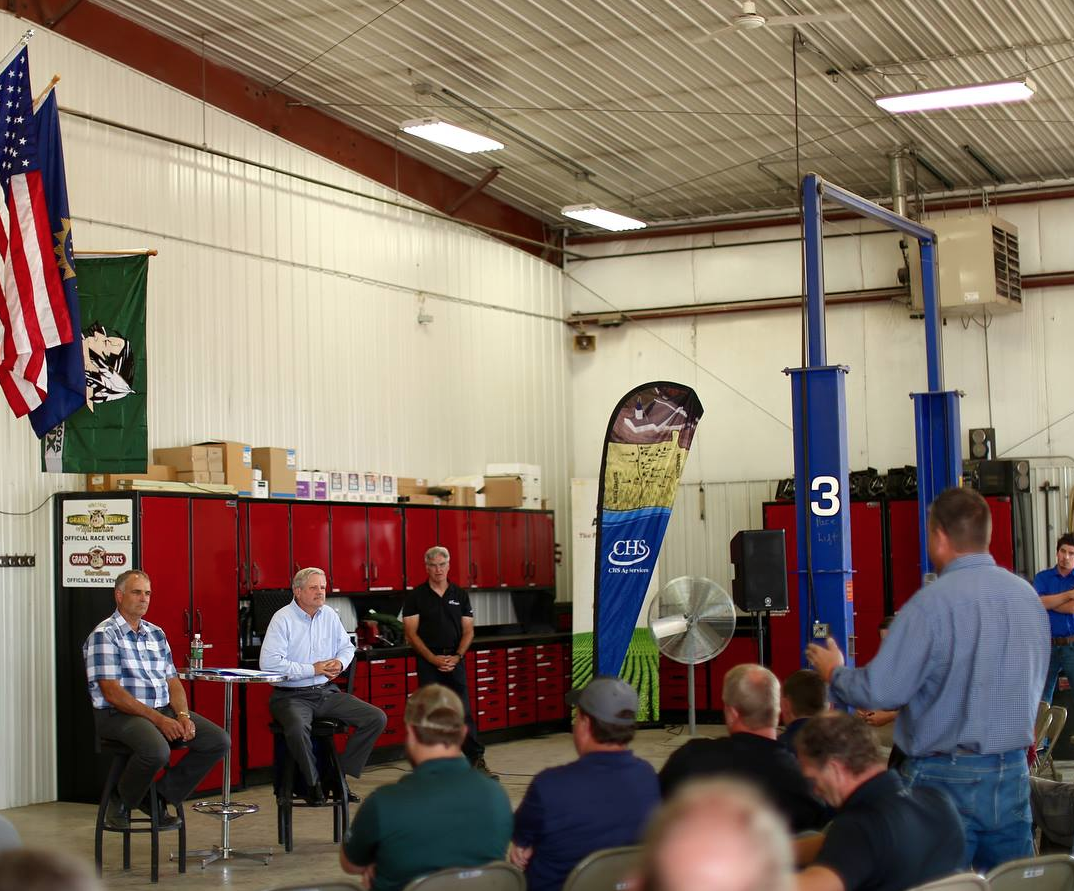Senator John Hoeven talks Farm Bill, Pricing, & Tariffs
North Dakota Farmer’s Union Grand Forks County Young Producer Event with Senator Hoeven
Sproule Farms wants to thank North Dakota Farms Union Grand Forks County for putting on this great event and giving us the opportunity to host it at our shop!
Hoeven meets with young farmers in Grand Forks
By Sydney Mook, Grand Forks Herald
Republican Sen. John Hoeven met with local, young farmers in Grand Forks to discuss tariffs and the upcoming farm bill Wednesday afternoon.
The average age of a farmer is around 60 years old, Hoeven said, adding that there are an array of issues that make it tough for young growers to stay involved in farming, including capital requirements.
“It’s not just getting farmland, which takes a lot of capital , but your equipment, operating,” he said. “There’s a lot of costs. Farming is a very sophisticated business now and so we have to find ways to help these young farmers.”
David Gorder, director of Grand Forks County Farmers Union, said “young producers are the future of agriculture,” but also noted that it is “a lot harder” for young people to get into farming.
“It’s not as easy as it was in the past,” said Gorder, a young farmer himself. “That’s why it’s good for young people to be active with their senators and their representatives, so they can work on things and programs like FSA.”
Farm bill
Hoeven also spoke to the group about the upcoming farm bill.
The bill is currently in conference committee to iron out differences between the House and Senate versions of the legislation. There are several differences between the two versions of the bill, one of the biggest being Supplemental Nutrition Assistance Program, or SNAP, work requirements. The Senate version provides $185 million to conduct pilot projects focused on employing people 50 years or older.
The House version would require all adults aged 18 to 59 to work at least 20 hours per week or be enrolled in a training program in order to receive SNAP benefits, more commonly referred to as food stamps.
The work requirements are projected to cut SNAP enrollment by around 1 million people and would decrease spending on SNAP by $20 billion over 10 years, according to the Congressional Budget Office.
Hoeven noted strong crop insurance, access to capital for farmers and ranchers, increasing markets for agriculture and agriculture research are also key provisions in the bill.
All three members of North Dakota’s delegation are on the conference committee, including Hoeven, Democrat Sen. Heidi Heitkamp and Republican Rep. Kevin Cramer.
If the bill were to pass before Sept. 30, it would be the first time in more than 20 years that the Farm Bill was passed before the current one expires, Hoeven said.
“I think the biggest challenge is going to be the food stamp issue, but we should be able to get there,” he said. “We should have a work requirement (for SNAP) and it should be a good one that we can agree on and get that done.”
Tariffs
Hoeven, along with Brad Thykeson, director of the state Farm Service Agency, outlined the U.S. Dept. of Agriculture’s short-term trade assistance program that is aimed to help producers specifically targeted by trading partners with retaliatory tariffs
Ag Secretary Sonny Perdue announced the $12 billion program to help farmers last month.
The programs include a market facilitation program which would result in farmer payments, a food purchase and distribution program which would purchase surplus of goods going to nutrition programs, and a trade promotion program to provide private sector assistance to new markets.
Growers should be able to sign up for the program beginning in the first week of September.




